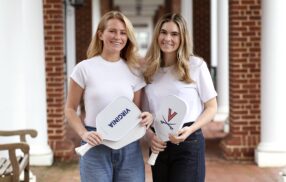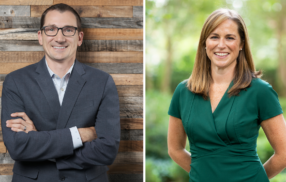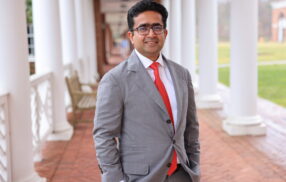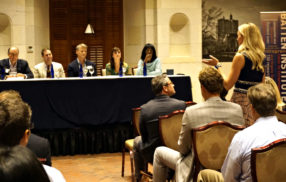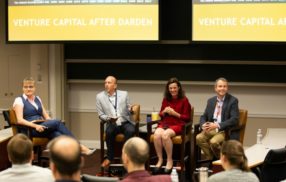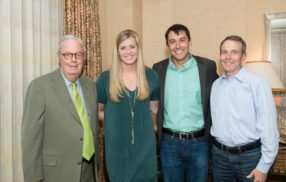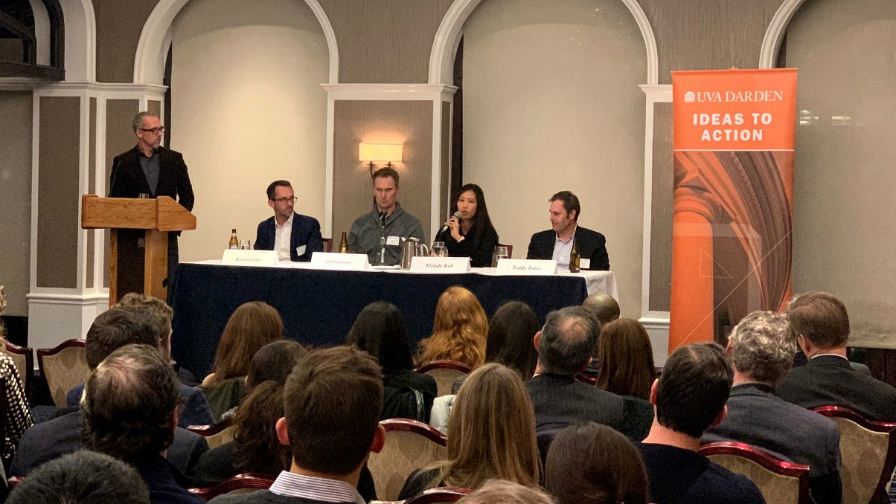
UVA Darden Ideas to Action Panel Explores Early Stage Venture Funding
By Jack Robertiello
While the availability of funding for innovative startups remains robust, venture capital and other forms of outside investment aren’t the only ways for founders to thrive.
At a recent panel hosted by the University of Virginia Darden School of Business Batten Institute for Entrepreneurship and Innovation in New York City, two venture founders eschewed outside money almost entirely. Teddy Jones (MBA ’12), co-founder of the recently-sold 501 Auctions, said he bootstrapped his site for five years.
Kent Collier, founder and CEO of Reorg Research and a graduate of UVA’s McIntire School of Commerce, said customers started paying from Day One for the company’s breaking news, comprehensive coverage and analysis on the high-yield, stressed and distressed markets. The $1.25 million he did raise wasn’t touched, and all profits immediately went back into the company.
For founders considering early stage funding, two seed-stage venture capitalists agreed that the early investments they make require some sort of connection with the founders. Melody Koh (MBA ‘12), a venture partner at NextView Ventures, explained that relationships are key when considering investing. “Every investor has a different process of assessing risk,” she said. “As a seed-stage investor, I describe my job as qualitative because, at this point, there are no numbers to analyze.” When operations can’t be quantitatively analyzed, about 80 percent of what a VC firm looks is in the culture, concept and values of the founders, Koh said.
Koh also suggested that a track record, signs of exceptionalism or other clues about the founders are important. Her firm is most confident about backing preproduct companies when led by founders whom they have known or whose work they have tracked.
Jeff Parkinson (MBA ‘10), co-founder and managing partner of KEC Ventures, an early stage venture capital fund, pointed out that while there is “a lot of money out there” looking for investment targets, approaching the correct VC helps. He described two types of VCs: generalists who build a portfolio from different types of investments and more vertical firms that seek projects falling within their specific range of expertise.
Koh’s seed-stage fund, for example, focuses on aspects of everyday lives that they think can be redesigned and transformed. She noted that most founders don’t often have the means or opportunity to get in front of VCs, but when able to meet with seed stage firm partners, they should ask for detailed feedback.
Parkinson’s KEC Ventures follows a deep-dive into a particular area of interest when looking for likely projects. “What we’ve always told our folks is that you want to meet as many people as possible in that specific area, talk to the experts, ultimately try to develop a thesis,” he said. “It takes a lot of patience and that’s at a time when the investing world is moving faster than ever.”
Different VC funds also collaborate, to the benefit of ventures seeking investment, Parkinson explained. “At our stage, there’s a ton of competition but also a lot of collaboration. Most of our rounds are $2–3 million, and we can’t write that big a check.” Often he will hear about interesting projects from other funds as a way to build a syndicate of investors.
The culture of a startup — how it arises, how it evolves and how it inevitably changes — plays an important part in how businesses evolve. “There’s a saying: ‘Culture eats strategy for lunch,’” said Koh. “You have to attract and retain good talent and culture plays into that, otherwise you cannot consistently execute, innovate and put out good products. That doesn’t mean foosball and free lunch. It means knowing the mission and how to extrapolate it from 20 to 500 people.” Her experience at Blue Apron, where she was head of product as the company grew, showed if companies have a solid foundation, the original culture remains. “Scaling culture is very hard, and Blue Apron felt different at every level.”
For 501 Auctions, Jones said culture was everything in the early days. “We found dynamic, hard-working, selfless people willing to dedicate themselves to the company, and we triumphed as a result of that.” But as the company evolved closer to a sale, he needed to make adjustments as more corporate needs took over. “Culture became a sink, even though in the early days it was an asset. At some point, there had to be a transition.”
Collier said he was more mission- and vision-oriented than focused on culture at Reorg Research, but when asked by recruits about his firm, his reply is: “It’s very intense. We don’t generally hire people with outside hobbies. We hire people who only think about their careers, and we serve as a vessel for them to express that for a couple of years and then move on.”
Collier’s interest in distressed debt developed when he was a research analyst with various buy-side firms, and he realized that tracking legal proceedings associated with distressed debt was very difficult. “I had no idea what I was doing, and now I have 160 employees; 500 customers including every major investment bank.”
While Collier said he was lucky, he said product and market fit gave him an advantage. “I tell my students not to start a business because they do not have any problems to solve. The problem I faced on the buy side, no one had solved.”
The University of Virginia Darden School of Business prepares responsible global leaders through unparalleled transformational learning experiences. Darden’s graduate degree programs (MBA, MSBA and Ph.D.) and Executive Education & Lifelong Learning programs offered by the Darden School Foundation set the stage for a lifetime of career advancement and impact. Darden’s top-ranked faculty, renowned for teaching excellence, inspires and shapes modern business leadership worldwide through research, thought leadership and business publishing. Darden has Grounds in Charlottesville, Virginia, and the Washington, D.C., area and a global community that includes 18,000 alumni in 90 countries. Darden was established in 1955 at the University of Virginia, a top public university founded by Thomas Jefferson in 1819 in Charlottesville, Virginia.
Press Contact
Molly Mitchell
Associate Director of Content Marketing and Social Media
Darden School of Business
University of Virginia
MitchellM@darden.virginia.edu



